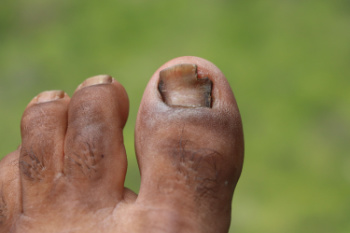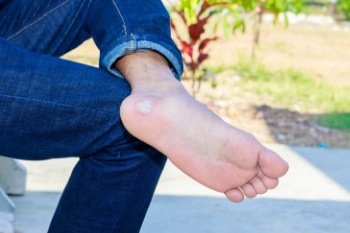Items filtered by date: April 2025
Symptoms and Causes of Poor Circulation in the Feet

Poor circulation in the feet can lead to discomfort and may signal underlying health concerns. Common symptoms include cold feet, tingling, numbness, cramping, or a heavy sensation, especially during walking or rest. The skin may appear pale or bluish, and wounds may heal slowly. These signs often result from reduced blood flow, which limits oxygen and nutrient delivery to the tissues. Causes include peripheral artery disease, where narrowed blood vessels restrict circulation, and diabetes, which can damage blood vessels over time. Other contributing factors are smoking, obesity, and a sedentary lifestyle. Poor circulation can also stem from blood clots or nerve conditions. If you have any of the above symptoms, it is strongly suggested that you visit a podiatrist who can help you to manage this condition.
Poor circulation is a serious condition and needs immediate medical attention. If you have any concerns with poor circulation in your feet contact Wendy K. Stinson, DPM of New Jersey. Our doctor will treat your foot and ankle needs.
Poor Circulation in the Feet
Poor blood circulation in the feet and legs is can be caused by peripheral artery disease (PAD), which is the result of a buildup of plaque in the arteries.
Plaque buildup or atherosclerosis results from excess calcium and cholesterol in the bloodstream. This can restrict the amount of blood which can flow through the arteries. Poor blood circulation in the feet and legs are sometimes caused by inflammation in the blood vessels, known as vasculitis.
Causes
Lack of oxygen and oxygen from poor blood circulation restricts muscle growth and development. It can also cause:
- Muscle pain, stiffness, or weakness
- Numbness or cramping in the legs
- Skin discoloration
- Slower nail & hair growth
- Erectile dysfunction
Those who have diabetes or smoke are at greatest risk for poor circulation, as are those who are over 50. If you have poor circulation in the feet and legs it may be caused by PAD and is important to make changes to your lifestyle in order to reduce risk of getting a heart attack or stroke. Exercise and maintaining a healthy lifestyle will dramatically improve conditions.
As always, see a podiatrist as he or she will assist in finding a regimen that suits you. A podiatrist can also prescribe you any needed medication.
If you have any questions please feel free to contact our office located in Parsippany-Troy Hills, NJ . We offer the newest diagnostic and treatment technologies for all your foot and ankle needs.
Plantar Warts Can Be Treated!
How Athletes Can Tackle Toenail Fungus

Athletes are more likely to develop onychomycosis, a fungal infection of the toenails. Constant sweating, wearing tight shoes, and exposure to communal areas like locker rooms create an ideal environment for fungus to thrive. Repetitive trauma to the toenails from running or sporting activity can also make nails more vulnerable to infection. Early signs include discoloration, thickening, and crumbling of the nail. If left untreated, onychomycosis can cause pain, make wearing shoes difficult, and even lead to secondary bacterial infections. Treatment often involves topical antifungal medications, oral prescriptions, or laser therapy. Athletes can help prevent onychomycosis by keeping their feet clean and dry, changing socks regularly, wearing breathable shoes, and using shower shoes in public areas. If you notice changes in your toenails, it is suggested that you see a podiatrist for diagnosis and appropriate treatment.
If left untreated, toenail fungus may spread to other toenails, skin, or even fingernails. If you suspect you have toenail fungus it is important to seek treatment right away. For more information about treatment, contact Wendy K. Stinson, DPM of New Jersey. Our doctor can provide the care you need to keep you pain-free and on your feet.
Symptoms
- Warped or oddly shaped nails
- Yellowish nails
- Loose/separated nail
- Buildup of bits and pieces of nail fragments under the nail
- Brittle, broken, thickened nail
Treatment
If self-care strategies and over-the-counter medications does not help your fungus, your podiatrist may give you a prescription drug instead. Even if you find relief from your toenail fungus symptoms, you may experience a repeat infection in the future.
Prevention
In order to prevent getting toenail fungus in the future, you should always make sure to wash your feet with soap and water. After washing, it is important to dry your feet thoroughly especially in between the toes. When trimming your toenails, be sure to trim straight across instead of in a rounded shape. It is crucial not to cover up discolored nails with nail polish because that will prevent your nail from being able to “breathe”.
In some cases, surgical procedure may be needed to remove the toenail fungus. Consult with your podiatrist about the best treatment options for your case of toenail fungus.
If you have any questions, please feel free to contact our office located in Parsippany-Troy Hills, NJ . We offer the newest diagnostic and treatment technologies for all your foot care needs.
How to Treat Stubborn Plantar Warts

Plantar warts are small growths that develop on the soles of your feet. They are caused by the human papillomavirus, or HPV, which enters the skin through tiny cuts or breaks in the skin. While often harmless, plantar warts can become painful, especially when located on weight-bearing areas like the heel or ball of the foot. Walking can feel like you’re stepping on a pebble, and over time, the pressure may cause the wart to grow inward beneath thick layers of skin. Mild treatments do not always work and can take months to show results. A podiatrist offers more effective options, including cryotherapy, or freezing, as well as topical acids, or minor surgical removal. Early treatment not only relieves discomfort but also helps prevent the wart from spreading to other areas or people. If you suspect you have a plantar wart and it is not improving, it is suggested that you schedule an appointment with a podiatrist for proper diagnosis and appropriate treatment.
Plantar warts can be very uncomfortable. If you need your feet checked, contact Wendy K. Stinson, DPM from New Jersey. Our doctor will assist you with all of your foot and ankle needs.
About Plantar Warts
Plantar warts are the result of HPV, or human papillomavirus, getting into open wounds on the feet. They are mostly found on the heels or balls of the feet.
While plantar warts are generally harmless, those experiencing excessive pain or those suffering from diabetes or a compromised immune system require immediate medical care. Plantar warts are easily diagnosed, usually through scraping off a bit of rough skin or by getting a biopsy.
Symptoms
- Lesions on the bottom of your feet, usually rough and grainy
- Hard or thick callused spots
- Wart seeds, which are small clotted blood vessels that look like little black spots
- Pain, discomfort, or tenderness of your feet when walking or standing
Treatment
- Freezing
- Electric tool removal
- Laser Treatment
- Topical Creams (prescription only)
- Over-the-counter medications
To help prevent developing plantar warts, avoid walking barefoot over abrasive surfaces that can cause cuts or wounds for HPV to get into. Avoiding direct contact with other warts, as well as not picking or rubbing existing warts, can help prevent the further spread of plantar warts. However, if you think you have developed plantar warts, speak to your podiatrist. He or she can diagnose the warts on your feet and recommend the appropriate treatment options.
If you have any questions please feel free to contact our office located in Parsippany-Troy Hills, NJ . We offer the newest diagnostic and treatment technologies for all your foot and ankle needs.

